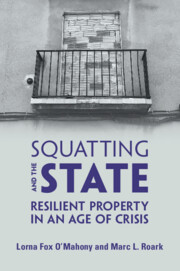Book contents
- Squatting and the State
- Squatting and the State
- Copyright page
- Dedication
- Contents
- Preface and Acknowledgments
- Introduction Squatting, Scale, and the State
- Part I Squatting and the State
- Part II Resilient Property in an Age of Crises
- 5 Resilient Property Methodology
- 6 Possession, Pragmatism, and Homeless Squatters
- 7 Ownership and Absent Owners
- 8 Aggregated Interests
- Part III Resilient Property in Action
- Bibliography
- Index
8 - Aggregated Interests
Neighborhoods, Markets, and Social Movements
from Part II - Resilient Property in an Age of Crises
Published online by Cambridge University Press: 11 August 2022
- Squatting and the State
- Squatting and the State
- Copyright page
- Dedication
- Contents
- Preface and Acknowledgments
- Introduction Squatting, Scale, and the State
- Part I Squatting and the State
- Part II Resilient Property in an Age of Crises
- 5 Resilient Property Methodology
- 6 Possession, Pragmatism, and Homeless Squatters
- 7 Ownership and Absent Owners
- 8 Aggregated Interests
- Part III Resilient Property in Action
- Bibliography
- Index
Summary
States respond to homeless squatting in empty land by selectively conferring resilience on individuals, groups and/or institutions. In this chapter, we reflect on the role of aggregated or collective claims to state-backed resilience linked to homeless squatting on empty property. Specifically, we consider how interests become aggregated; how aggregation promotes collective consciousness and reaffirms individual claims; and how groups garner state support through the exercise of collective influence or voice. We recognize that the co-option of state actors and agencies to shore up the resilience of the group is not unidirectional but bidirectional. While collective or group interests may seek out state-backed resilience in the form of “other-regarding” state action, states also invoke collective interests to justify or explain their actions, particularly when the state’s own self-interest aligns with the interests or claims of the group. In this chapter we broaden the scope of our “problem topography” by alternately centering a range of networked or aggregated stakeholders: neighbors, market actors, social activists. We explore how collective interests cluster around specific claims; how they exercise influence to secure state action, and also how state actors and institutions justify or explain their responses with reference to the protection of specific group interests. These collective claims are not distinct from, but overlap with the individual claims of owners and squatters, who are themselves simultaneously self-interested individuals and members of networks that share common interests and goals.
Keywords
- Type
- Chapter
- Information
- Squatting and the StateResilient Property in an Age of Crisis, pp. 292 - 336Publisher: Cambridge University PressPrint publication year: 2022

